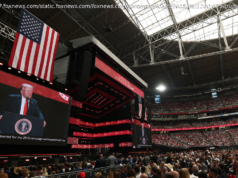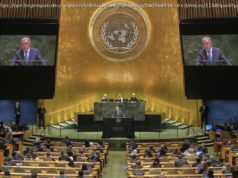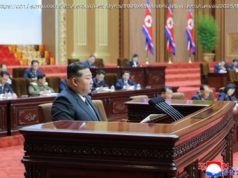Some of those testifying about the proposal commended the tariffs, and others criticized them. But all agreed on the potential for the plan to irrevocably alter the course of their businesses.
WASHINGTON — Mary Buchzeiger describes herself as a proud Republican who was drawn to President Trump’s business-friendly philosophy. But the president’s plan to impose sweeping tariffs on $50 billion of products from China now threatens to cripple an automotive supply business in Michigan that her father began and that she has spent years building.
“I’m angry, I’m frustrated, and honestly, I’m scared,” Ms. Buchzeiger said on Tuesday morning, as she joined dozens of other vulnerable entrepreneurs, as well as supporters of the Trump administration’s trade agenda, at a public hearing about the tariffs. “Scared that my president is about to make a terrible mistake.”
Over the next three days, business owners, trade groups and other industry representatives will testify before United States trade officials about the administration’s plan to impose tariffs on more than 1,300 Chinese imports, including flat-screen TVs, steel and medical devices, and as it threatens levies on an additional $100 billion of Chinese goods. For business owners like Ms. Buchzeiger, the hearings are a last-ditch attempt to shift the White House away from punitive trade measures that are putting American companies at risk, as the two countries engage in tit-for-tat tariffs that could hurt businesses dependent on access to China.
The hearings come at a moment of brinkmanship and negotiation, with the world’s two largest economies repeatedly veering toward a trade war only to reverse course and edge instead toward diplomatic discussions.
The economic relationship now hinges on trade talks happening this week between top Trump administration officials and Liu He, a Chinese vice premier who arrived in Washington on Tuesday. Chinese negotiators and global businesses remain uncertain about whether the United States will move ahead with its plan to impose hefty tariffs and investment restrictions on China in an effort to pressure economic reforms — or whether Mr. Trump will seek to avoid a damaging trade war by cutting a quick deal.
Mr. Trump appeared to soften his stance on China in a series of tweets this week, as he emphasized his friendship with the Chinese president, Xi Jinping, and said the United States would consider easing penalties on ZTE, a Chinese telecom firm. In a tweet on Tuesday, Mr. Trump said “trade negotiations are continuing with China” and to “stay tuned!”
“I think the time is right for China to make changes they should have been making for the past 15 to 20 years,” Larry Kudlow, the president’s top economic adviser, said at an event in Washington on Tuesday morning.
The uncertainty over the administration’s approach has left global businesses that compete or cooperate with China at turns hopeful and despairing. Looming tariffs on a wide variety of goods from China are just one source of unpredictability for American companies: The administration is also in the midst of finalizing tariffs on steel and aluminum imports and trying to rework the North American Free Trade Agreement, which has been mired in disagreements among Canada, Mexico and the United States.
The array of companies testifying in a hushed hearing room in Washington on Tuesday included TV makers, auto parts suppliers, steel companies and retailers. Some commended the planned 25 percent tariffs on Chinese imports and others blasted them, but all agreed on the potential for the Trump administration’s actions to irrevocably alter the course of their businesses.
Those testifying on Tuesday morning included executives from the solar cell and module manufacturer SolarWorld Americas, the wind turbine maker American Superconductor Corporation and the United States Steel Corporation, all companies that say they have had intellectual property stolen by Chinese actors and have assisted in the Trump administration’s investigation into unfair Chinese trade practices. In March, the United States trade representative determined that the Chinese had violated American intellectual property, a finding that gave Mr. Trump the authority to impose tariffs and other restrictions.
Many business owners pleaded with the administration to be even tougher on China and help protect their businesses against foreign competition. Cory Watkins, the president of Schumacher Electric, which manufactures car battery chargers and jump starters primarily in North America, asked the administration to include more of the company’s finished products in the tariff list.
Mr. Watkins said the company had learned in the last few weeks that one of its biggest customers had signed a contract with a Chinese manufacturer that Schumacher Electric has sued for stealing its intellectual property. Without the tariff protections, Mr. Watkins said, “we still run the risk of the very problem we’re facing today, which is Chinese companies taking our intellectual property, copying it and selling it to our own customers.”
Companies caught in the tariffs cross-fire, like the electronics retailer Best Buy and the TV streaming device maker Roku, protested that they would face higher prices to import products from China and that those costs would ultimately be passed on to American consumers. Michelle Erickson Jones, a Montana farmer and a member of the trade lobbying group Farmers for Free Trade, complained that trade tensions were already costing American farmers, who were facing canceled orders of soybeans and wine and seeing perishable shipments held up in Chinese ports.
Representatives from Chinese business groups argued that the proposed tariffs were arbitrary, were inconsistent with World Trade Organization rules and put millions of American jobs tied to trade with China at risk. “Should the U. S. implement the proposed action, it will lead to nothing but confrontation between the two countries,” said Jian Tan, a representative of the China Chamber of International Commerce.
The Trump administration has said it devised its tariff list to remove goods that were vital to American consumers. But in the process, many economists say, the administration ended up targeting the imported parts and machinery that businesses depend on to run American-based operations.
Ms. Buchzeiger’s company, Lucerne International, used to source more products from within the United States. But when the financial crisis hit, her American suppliers started to fold, and the company had to look abroad. The company supplies 28 parts for the Jeep Wrangler, which Lucerne sources from seven manufacturing facilities in China, she said.






